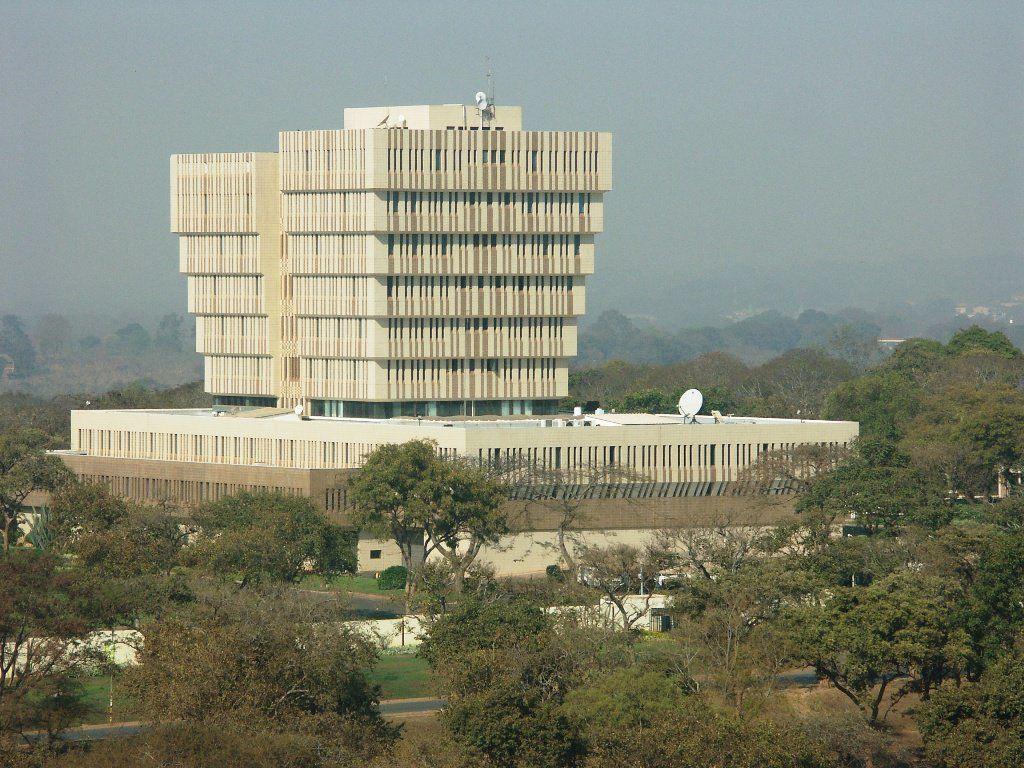Africa-Press – Malawi. Reserve Bank of Malawi (RBM) has applied for stay of application of judgment made by Judge Kenyatta Nyirenda who ordered the bank to restart procurement process for the 1.8 Billion Kwacha ICT contracts for procurement of Flexcube and ATS equipment after the judge found that the bank flouted its own procurement procedures.
In their application on the stay of the judgement to retender made on 19th of October 2021, the Central Bank has indicated that they are heading to Supreme Court in what appears to be a desperate attempt to still award the tenders to Mitra who is the 2nd interested party in the case, no matter the cost to the taxpayer.
The decision to go to Supreme Court has been done by the bank despite both the High court and the PPDA review committee finding the bank on the wrong side for flouting their own procurement procedures to award the two contracts worth over 1.8 billion to Mitra system, a company which does not have required experience and expertise to execute such tenders as per report from the forensic audit done by Deloitte which was sanctioned by the bank itself for its internal use.
Deloitte found out that the company Mitra which is jointly owned by Robert Benimana, a Rwandese national and Martin Masawi, a Zimbabwean national, not only did it not have enough experience as it was only registered in 2018 hence having 2 years’ experience only while the tender required minimum of 5 years’ experience, but also did not have experience to execute such tender as it has only executed contracts of average 40 million kwacha and also demanded 60% advance payment despite the tender specifically mentioning that any bidder requesting advance payment will be disqualified.
In their application for stay of the decision for which the bank is now using the new external lawyers from Mbendera & Nkhono Asociates, which will likely cost more to the taxpayer, the bank is arguing that the judge erred in law when making the decision for the bank to retender.
“The learned Judge erred in law to hold that the claimant was wrong to attribute the business experience of the partnership of the 2nd Interested Party to the 2nd Interested Party and thereby ignored that the partner of the 2nd Interested Party and the 2nd Interested Party were identical and/or co-existence,” reads part of the Appeal document.
Furthermore, RBM argues that re-tendering of the said contracts will not be possible due to the fact that the delays in procurement of the ICT equipment needs to be revised to match with time to which Mitra submits in support.
“Such that if the re-tender was to proceed, the bank run the risk of acquiring a software that may not be compatible with the hardware, which in the end, might result into performance challenges,” reads part of the arguments raised in the sworn statement.
The bank also argues that although they need the equipment and might add some specifications, they are against the court decision which restricted the re-tender to only qualified bidders who bid last time. The bank wants the retender to be open to everyone which can allow them to change technical specifications and the evaluation criteria.
General Manager for Mitra, who is the 2nd Responded and was awarded the controversial contracts, was quick to support RBM’s application for a Stay Order, saying they duly submitted what was required of them during the bidding process and came out successful because they met all the requirements. He then concurred with the Appellant that Judge Nyirenda erred in delivering the judgment.
“On our part, we share in the 1st Ground of Appeal that the Court erred in law to hold that that the Claimant was wrong to attribute the business experience of the partners of the 2nd Interested Party to the 2nd Interested Party and thereby ignored that the Partners of the 2nd Interested Party and the 2nd Interested Party were Identical and/or co-extensive,” he added.
“I believe that when we balance all competing interests, it is fair and just to consider granting the prayer for stay and/or a suspension of enforcement of judgement pending appeal. Wherefore, I pray to the Honourable Court to grant the application as prayed for,” he concluded.
However, the development has attracted serious reactions from both the PPDA and Sparc Systems Limited, advising the Court to dismiss the case with costs.
PPDA through its Director of Capacity Development, Advisory Services and Reforms Timothy Kalembo questioned the decision behind the appeal when it did not amount to the Court making a procurement decision for the Central Bank.
He wondered as to why RBM would seek for a stay order when the Court has only asked for a re-tender and not making any procurement decision on behalf of the Claimant.
“The Court is not making any procurement decision by ordering the re-tender since the process will commence again with the user department by submitting a requisition and properly revise and modify the specifications which will be drafted in the bidding document to be issued to the bidders.”
“It is therefore erroneous to say the Court has usurped the decision making role of the Claimant in this procurement as demonstrated in the entire sworn statement.”
Kalombo further reminded RBM that under the Public Procurement law, every procurement process can be cancelled if there is need to substantially modify the bidding document by revising the specifications.
“Public Procurement law provides for scenarios that a procurement process can be cancelled if there is need to substantially modify the bidding document by revising the specifications,” reads part of the sworn statement by Kalombo.
He also questioned the presence of the new lawyers when they were not on record as representing the bank as shown by the notice of Appointment of Legal Practitioners.
“At the time of filling the said notice of Appeal, the said Messrs Mbendera and Nkhono Associates were not on record as representing the Claimant as shown by the Notice of Appointment of the Legal Practitioners, filed on 19 October, 2021 and served on the Defendant’s lawyers on 20 October, 2021,” he argued.
Sparc’ Managing Director Wisely Phiri said the application for a Stay Order is a deliberate move by RBM to ignore the Court ruling so that it awards the 2nd Interested Party, Mitra Systems the tenders at all cost to suit its own interests.
“It is clear to me that the stay application is a belated attempt by the Claimant to evade the outcome of a court process that was initiated by itself so that eventually it does what it has always wanted to do and that is award the procurement contract in issue to the 2nd Interested Party despite the process having been severely faulted by this Court, the Defendant as well as forensic auditors appointed by the Claimant itself.”
“All the 1st Interested Party is asking for is a fair and transparent opportunity to participate in a public procurement. The suggestion that the Court has all but granted the 1st Interested Party procurement contract is unfounded and ill advised. Should the Claimant re-tender, the 1st Interested Party along with the rest of the other bidders who were not declared as unqualified by the Court, namely Oranux and Move Secure, will have to decide whether they want to participate in the fresh procurement proceeding,” he explained.
He wondered why the bank did not act on the decision of the court which ordered a re-tender of the two tenders at the reduced period of 21 days but has been elusive to abide by the court order. The bank only came back to the court 57 days later after the 1st Interested party, Sparc systems got an order from the court on the 5th of October enforcing the bank to comply with the court order to retender within the next 14 days or risk contempt to which the bank then on 19th October applied for suspension of the judgement indicating that that they intend to appeal to the Supreme court.
He then refuted claims by the Central Bank that re-tendering would lead to purchasing a obsolete equipment. ” For the Flexicube, the Claimant specified the following equipments: IBM Enterprise Server E950 (Server 1:9040 Model MR9); IBM Networking switch – 8960-F24 (IBM Storage Networking SAN24B-6); Dell EMC Unity storage 380F model. All these are current models that are being sold on the market. The forecast shows that this equipment will be supported by the manufacturers and warranty centers, to which we are in Malawi, for up to or beyond year 2030.
“As the foregoing demonstrates, there is no credible or legitimate reason why the tender of the procurement of the Flexicube equipment cannot be proceed with. It certainly is not correct that if a fresh tender is floated, the Claimant will procure obsolete or useless ICT equipment.
For the ATS equipment, the IBM Networking switch – 8960-F24 is currently still in sale. The Claimant in its bid documents specified version SAN24B-5 for this switch. IBM has produced a new model SAN24B-6 as a replacement model for the switch that the Claimant had specified. This cannot stop the Claimant from buying it or using it, therefore. Even if it specified the latest version of the switch, however, I believe that it would not be changing the nature of the procurement or the ICT equipment to be procured,” he said.
“The Claimant is well able to procure equipment that will still be fit for purpose. The specifications can be changed to provide for what is currently available on the market without at all changing the nature of the procurement. It behoves any bidder who know what he is doing to make sure that he offers to supply equipment which represents the state of the technology and is not obsolete,” he added.
He then pleaded with the Court not to grant the Central Bank the Stay Order, saying the Claimant is a public institution and it is only proper that the way it handles issues not be personalized by officers within it with narrow personal vendetta.
“It would appear that the Claimant has decided that it is going to do whatever it can to award the contracts in issue to the 2nd Interested Party. The flipside is that the Claimant also appears to have taken the view that it will do whatever it can to ensure that the 1st Interested Party does not even have an opportunity of being awarded the contracts in issue. I think that this is an attitude that is deserving of censure and denunciation by this Court. The Claimant is a public institution and it is only proper that the way it handles issues not be personalized by officers within it with narrow personal vendettas.”
“It will be utterly unjust, therefore, if the sought order of stay was granted. I accordingly pray that the application be dismissed with costs on an indemnity scale,” he concluded.
The stay application which was before Judge Kenyatta Nyirenda on the 29th of October has been adjourned to 23rd November 2021 HOW THE LEGAL BATTLE STARTED?
The whole legal battle started when RBM awarded the controversial contracts to Mitra Systems Limited despite Mitra not meeting bidding requirements, which one of them being operating for a minimum of five years.
The decision forced Sparc Systems Limited to lodge a complaint to the PPDA which then ordered the Central Bank to re-tender the bids which was awarded to Mitra Systems Limited.
This did not go well with the Central Bank which took the issue to the High Court suing Sparc Systems Limited in a bid to convince the Court to still go ahead to award the said ICT company the controversial contracts.
But this was rejected by Judge Nyirenda who faulted RBM for wrongly naming Sparc Systems Limited as defendant instead of PPDA which had ordered it to re-tender, saying Sparcs Systems Limited was an interested party in the whole saga.
Sparcs Systems Limited had faulted RBM for flouting its own set of rules, which among others, included a requirement of a 5-year experience in supply of ICT equipment.
The company which was awarded the contracts had a two-year experience, contrary to the set of rules that were placed in the bidding process. The Central Bank had defended the decision by claiming that they have known individuals behind Mitra and that this means Mitra met the 5 years requirements.
RBM also argued that Sparcs Systems Limited failed to submit Manufacturer Authorization from Dell, an accusation which was turned down by the company which went ahead to show the review committee that it had matched the requirements to all the criteria including the Manufacturer Authorizations and technical details as requested in the bidding process.
Sparc also refuted RBM claim that the company had only one traceable reference in the bidding document which the Bank showed as a basis of disqualification. The company said it has more experience and references not only in Malawi but across Africa as shown in its bidding document and company profile submitted to RBM.
The Malawian ICT Service providers then went ahead to accuse the Bank of not following the procedure at bid opening by failing to go through the bid opening checklist to verify if the requested information was available in the bids, a normal trend that ensured the availability of Manufacturer’ Authorization, bid security and bid validity period are checked and verified in the presence of representatives.
And when Sparc Systems Limited brought these accusations against RBM to the PPDA review committee which then ordered the Central Bank to render, the Bank rushed to the Court to obtain a stay of the enforcement of the decision by PPDA, questioning the committee’s legal powers and also accusing the committee of not providing enough reasons for its decision and also adding that the equipment was needed urgently for the running of critical systems for the Bank.
The ruling meant it was back to square one for RBM as the process was supposed start all over again. In the ruling of the 23rd of August 2021 under Civil Case 13 of 2021, High Court Judge Kenyatta Nyirenda ruled against the bank and ordered it to retender at a reduced period of 21 days. He also ordered that only qualified bidder who bid last time should be allowed to participate. Since Mitra has been found to be unqualified by the court it seems RBM has been reluctant to retender the two tenders.
For More News And Analysis About Malawi Follow Africa-Press






